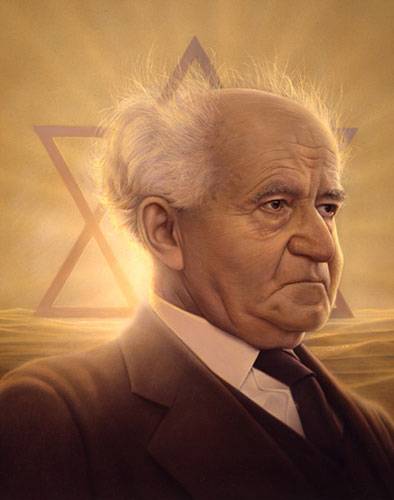
David
Ben-Gurion
(1886 - 1973)
David Ben-Gurion was born in Plonsk, Poland in 1886 and educated in a Hebrew school established by his father, an ardent Zionist. By his mid-teens, Ben-Gurion led a Zionist youth group, "Ezra," whose members spoke only Hebrew among themselves.
At the age of 18 he became a teacher in a Warsaw Jewish school and joined the Socialist-Zionist group "Poalei Zion" (Workers of Zion).
Arriving in the Land of Israel in 1906, he became involved in the creation of the first agricultural workers' commune (which evolved into the Kvutzah and finally the Kibbutz), and helped establish the Jewish self-defense group, “Hashomer” (The Watchman).
Following the outbreak of World War I he was deported by the Ottoman authorities with Yitzhak Ben-Zvi (later, Israel's second President). Ben-Gurion traveled on behalf of the Socialist-Zionist cause to New York, where he met and married Paula Monbesz, a fellow Poalei Zion activist. He returned to Israel in the uniform of the Jewish Legion, created as a unit in the British Army by Zionist leader Vladimir Jabotinsky.
Ben-Gurion was a founder of the trade unions, and, in particular, the national federation, the Histadrut, which he dominated from the early 1920's. He also served as the Histadrut's representative in the World Zionist Organization and Jewish Agency, and was elected chairman of both organizations in 1935.
Having led the struggle to establish the State of Israel in May 1948, Ben-Gurion became Prime Minister and Defense Minister. As Premier, he oversaw the establishment of the state's institutions. He presided over various national projects aimed at the rapid development of the country and its population: “Operation Magic Carpet,” the airlift of Jews from Arab countries, the construction of the national water carrier, rural development projects and the establishment of new towns and cities. In particular, he called for pioneering settlement in outlying areas, especially in the Negev.
In late 1953, Ben-Gurion left the government and retired to Kibbutz Sde Boker in the Negev. He returned to political life, after the Knesset elections in 1955, assuming the post of Defense Minister and later the premiership.
Continuing as Prime Minister, Ben-Gurion supported the establishment of relations with West Germany, despite bitter opposition. He also led the country during the 1956 Sinai campaign, in which Israeli forces temporarily secured the Sinai peninsula.
In June 1963 Ben-Gurion resigned as Prime Minister, citing “personal reasons.” Levi Eshkol took over the posts of Prime Minister and Defense Minister. But Ben-Gurion remained active politically, with a rivalry developing between him and Eshkol. In June 1965, the Mapai Party split, with Ben-Gurion establishing Rafi (List of Israeli Workers), which won ten Knesset seats in the following election. In 1968, Rafi rejoined Mapai and Ahdut Ha'avoda, to form the Israel Labor Party, while Ben-Gurion formed a new party, Hareshima Hamamlachtit (The State List), which won four Knesset seats in the 1969 elections.
In June 1970, Ben-Gurion retired from political life and returned to Sde Boker where he passed away in 1973.
Courtesy of:
http://www.jewishvirtuallibrary.org/jsource/biography/ben_gurion.html
